#tdtstudy
Text
JLPT N2 文法・もの
In this post let's look at various N2 grammar points involving もの.
★ものなら★

if I/we could; if A is possible, then B; if one can do something, then ~
This grammar structure implies that the task is either impossible or very unlikely.
Verb (れる form) + ものなら
Verb (れる form) + もんなら (spoken)
例文
帰れるものなら、今すぐ、国へ帰りたい。
If I could, I'd like to go back to my country right now.
やれるもんなら、やってみろ。
If you can do it, then let's see you try.
★ものだから★
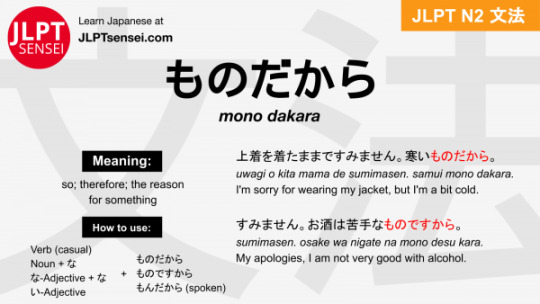
so; therefore; the reason for something
This is often used when telling an excuse or declining an invitation.
Verb (casual) + ものだから・ものですから・もんだから (spoken)
Noun + な + ものだから・ものですから・もんだから (spoken)
な-Adjective + な + ものだから・ものですから・もんだから (spoken)
い-Adjective + ものだから・ものですから・もんだから (spoken)
例文
すみません、風邪を引いてしまったものですから、今日は欠席です。
I'm sorry, I caught a cold and so I will be absent today.
私の変わりにこれをしていただけませんか。私は大変に忙しいものですから。
Could you please do this on my behalf? Because I am too busy to do it myself.
★もの★
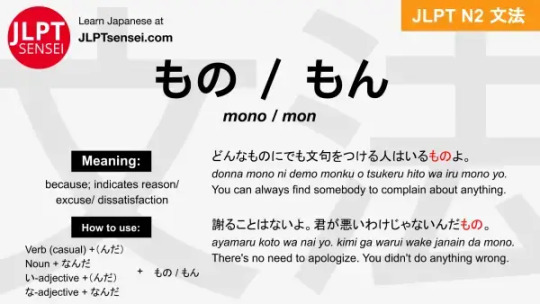
because; indicates reason/excuse/dissatisfaction
This is used to express a reason to justify something.
例文
私何も話すことなんかありませんよ。だって何も知らないんですもの。
I have nothing to say. I mean, I don't even know anything.
謝ることはないよ。君が悪いわけじゃないんだもの。
There's no need to apologize. You didn't even do anything wrong.
★ものの★

but; although; even though ~
Verb (casual) + ものの
Noun + である + ものの
い-adjective + ものの
な-adjective + な + ものの
例文
私のアパートは駅からはちょっと遠いものの、静かできれいな住宅街にある。
My apartment may be far from the station, but it is in a very quiet and beautiful neighborhood.
秋であるものの、まだ暑い。
Although it's fall, it is still hot.
#日本語#japanese#japanese language#japanese langblr#japanese studyblr#文法#japanese grammar#jlpt n2#tokidokitokyo#tdtstudy#ものなら#ものだから#もの#ものの
53 notes
·
View notes
Text
慣用句
かんようく
idiom; set phrase; idiomatic phrase
小学生(高学年)が知っておきたい、良く使う重要な慣用句とその意味を、あいうえお順にならべ一覧表プリントを作りました。
しょうがくせい(こうがくねん)が しって おきたい、よく つかう じゅうよう な かんようく と その いみ を、あいうえお じゅん に ならべ いちらんひょう プリント を つくりました。
We have created a printed list of frequently used and important idioms and their meanings that elementary school students (upper grades) should know, arranged in alphabetical order.

#日本語#japanese#japanese language#japanese langblr#japanese studyblr#langblr#studyblr#単語#語彙#japanese vocabulary#tokidokitokyo#tdtstudy
32 notes
·
View notes
Text
The あいうえお Game
Hello! I wanted to share with you a game that I made up that I like to use to practice Japanese vocabulary in my spare time (i.e. when I'm bored and don't have access to a phone). This game works well when you don't have time to do formal studying but want to challenge yourself for a short time anyways.
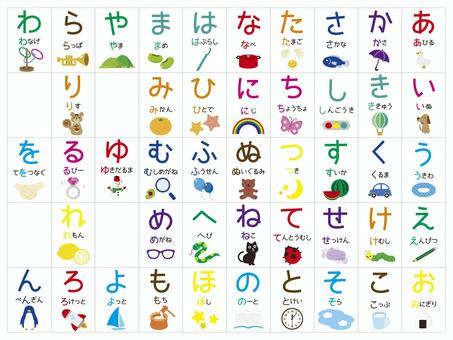
How to Play?
The general idea of the game is to come up with a word for each syllable of the Japanese alphabet/syllabary (あいうえお, etc.).
Step 1: Pick a Theme
You can pick any theme that you'd like, but I find that broader themes are easier to come up with words for than more specific themes.
Some of my favorite themes include:
Animals
Food
First Names
Last Names
Sports
You could also do verbs, adjectives, nouns, etc. Or, you can play anything goes!
Step 2: Think of as Many Words as Possible
Now, you just go through the syllabary in given (alphabetical?) order in your head and come up with a word that matches your theme starting with each syllable. Examples below!
Animals: あ=ありくい、い=イルカ、う=うさぎ、など
Food: あ=あんぱん、い=いも、う=うどん、など
First Names: あ=あいり、い=いえやす、う=うさこ、など
Last Names: あ=ありま、い=いとう、う=うえだ、など
Sports: あ=アイスホッケー、い=イースポーツ、う=ウィルチェアーラグビー、など
*など=etc.
Step 3: If You Get Stuck, Skip It!
If you get stuck on a syllable and can't think of anything, skip it! You can either come back to it look up a word later, or you can just forgive yourself for not having a vocabulary word to insert there. When I get stuck I usually skip it and try to keep my momentum going. The nice part about this game is that there is no score and no one is judging you!
And that's it! That's how to play the あいうえお game. I enjoy it because it's simple and it's portable and it's a great way to practice vocabulary. 皆さん楽しんでね!
#日本語#japanese#japanese language#japanese langblr#japanese studyblr#langblr#studyblr#japanese language learning game#tokidokitokyo#tdtstudy
213 notes
·
View notes
Text

夏の音・The Sound of Summer
じりじり scorchingly (of the sun)
きんきん ice-cold
チリンチリン the sound of a windchime (風鈴)
ゴロゴロ rumbling (of thunder)
ごろごろ idly, lazily, slothfully
ポツリポツリ in drops (e.g. of rain)
のたりのたり slowly (of undulating waves), gently (swelling, rolling, etc.)
ザーザー waves lapping on the shore
ミーンミーン call of the cicada
スイスイ swiftly, glidingly (e.g. fish in a stream)
かなかな call of the cicada at dusk
#日本語#japanese#japanese language#japanese langblr#langblr#studyblr#単語#語彙#オノマトペ#japanese vocabulary#onomatopoeia#tokidokitokyo#tdtstudy#夏の音
515 notes
·
View notes
Text
レタスクラブ
I wanted to recommend レタスクラブ to advanced Japanese learners.

レタスクラブ (Lettuce Club) is a site that has both レシピ and 読み物 that someone introduced me to recently. I came for the 読み物, but the レシピ looks good too.
I have been reading through some of the comics under the 読み物 section 趣味, which has a variety of artists and themes to choose from. This is definitely a site for advanced readers, but if you'd like to try to navigate around the site you can practice reading.
Start Here for Comics, then try:
趣味
くらし
育児・子育て
Happy reading!
#レタスクラブ#reading japanese through manga#comics#reading japanese for advanced learners#reading in japanese#読書#tokidokitokyo#tdtstudy
99 notes
·
View notes
Text
JLPT Grammar みたいだ・らしい・っぽい
What is the difference in usage among みたいだ、らしい、and っぽい? These grammar points can be difficult to differentiate, so I have gathered some notes and examples here. These grammar points are JLPT N4 or N3 grammar points.
★みたいだ★

Used for first-hand information or information you are observing for yourself.
Often used for something that has characteristics of something else (metaphorical similarities).
Most common in spoken language.
ここの砂は星みたいな形をしている。
ここ の すな は ほし みたいな かたち を して いる。
The grains of sand here are in the shape of a star.
このアパートは誰も住んでいないみたいだ。
この アパート は だれ も すんで いない みたい だ。
It looks like no one lives in this apartment building.
明日は雨みたいね。
あした は あめ みたい ね。
It looks like rain tomorrow.
リンさんみたいに日本語がうまくなりたい。
I want to be able to speak Japanese as well as Lin.
★らしい★

Used for things you infer, or information you have from another source.
Often used to something that has especially strong characteristics of its group (stereotypical similarities).
Most common in spoken language.
今日は春らしい暖かい日でした。
きょう は はる らしい あたたかい ひ でした。
Today was a warm spring-like day.
*Note: It is spring, and this is a stereotypically spring day.
私は女性らしい洋服はあまり着ない。
わたし は じょせい らしい ようふく は あまり きない。
I don't often wear feminine type clothes.
寝すぎるのは体に悪いらしいです。
ねすぎる の は からだ に わるい らしい です。
Sleeping too much is apparently bad for your body.
*Note: Second-hand source of information.
今日は君らしくないな。
きょう は きみ らしくない な。
You don't seem like yourself today.
★っぽい★
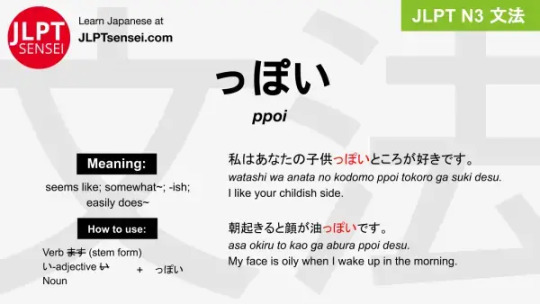
Can be used to say what something is like.
Can be used to say that something appears to be the opposite of what you would expect.
Can be used to describe something that someone is likely to do or often does.
Note:
When following a noun or い-adjective, the meaning is similar to -ish, -like, -ly. The number of adjectives that can be used with this grammar are limited. Usually negative when used after a noun or adjective, but not always.
When following a verb, the meaning is easy to do, often do. This grammar cannot be used with all verbs.
あの小学生は大人っぽい。
あの しょうがくせい は おとなっぽい。
That elementary school student acts like an adult.
油っぽい食事は好きじゃない。
あぶらっぽい しょくじ は すき じゃ ない。
I don't like oily foods.
飽きっぽいから何事も成功しないのだ。
あきっぽい から なにごと も せいこう しない の だ。
You don't succeed in anything because you are quick to lose interest.
年を取ると、忘れっぽくなる。
とし を とる と、わすれっぽく なる。
As one gets older, one tends to become more forgetful.
#日本語#japanese#japanese language#japanese langblr#japanese studyblr#langblr#studyblr#文法#japanese grammar#jlpt n3#jlpt n4#tokidokitokyo#tdtstudy
144 notes
·
View notes
Text
JLPT Grammar げ・がち・っぽい・気味
What is the difference in usage among げ、がち、っぽい、and 気味? These grammar points can be difficult to differentiate, so I have gathered some notes and examples here. These grammar points are JLPT N3/N2 grammar points.
★~げ★
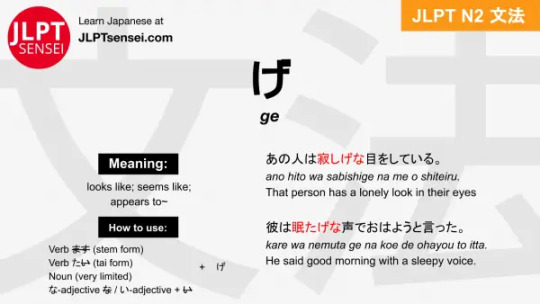
This is used it to describe something or someone (not yourself) who looks~ / seems~ / appears to~.
It is similar to そうに・そうな (sou ni / sou na), but げ (ge) is much more restricted with what words it can be paired with.
It is usually used to describe things like one’s emotions or state of being, whereas そう (sou) can be used with more general things like weather, etc.
Although this grammar is mostly used with adjectives, it can also be used with some verbs and nouns.
何か、言いたげだね。
They look like they want to say something.
ずいぶん、自信ありげだね。
You seem very confident.
そりゃあちょっとあやしげに見えますからね、そう思いませんか?
Well, that looks a little suspicious, don't you think?
同級生にテストの結果を聞くと、嬉しげな顔で100点だったと答えてくれた。
When I asked my classmate how they did on the test, they answered with a happy face that they got a perfect score.
★~がち★
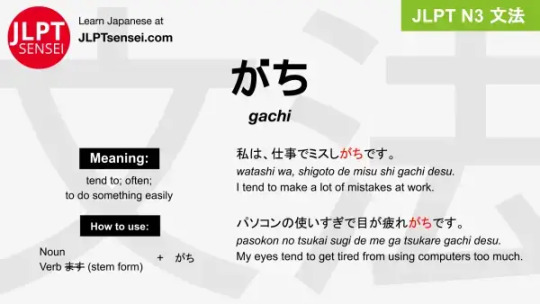
This is usually used for something negative.
ありがち = tend to have
になりがち = tend to become ~
遅れがち = tend to be late
留守がち = tend to be absent
彼は、学校をサボりがちです。
He is always skipping school.
ずっと曇りがちの天気が続いている。
The constant cloudy weather keeps continuing.
一人暮らしなので、コンビニ弁当ばかり食べがちだ。
I live alone, so I tend to only eat convenience store meals.
私は空腹の時は機嫌が悪くなりがちだ。
When I am hungry I easily get into a bad mood.
★~っぽい★
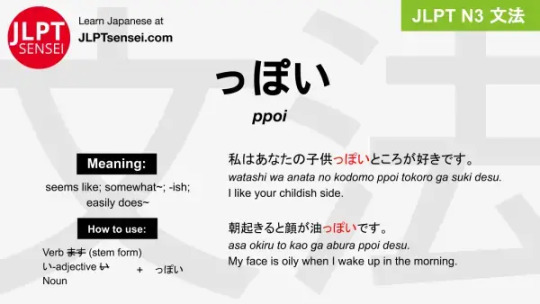
① When following a noun or い-adjective, this means -ish, -like, -ly. Note: The number of adjectives that can be used with this are limited.
子供っぽい = childish, childlike
男っぽい = manly, like a man
女っぽい = womanly, like a woman
油っぽい = oily, lots of oil
② When following a verb, this means easy to do, or often do~. Note: This cannot be used with all verbs.
忘れっぽい = easy to forget, often forget
怒りっぽい = easy to anger, often angry
このコート、デザインはいいけれど、生地が安っぽいね。
This coat has a nice design, but the material looks cheap.
油っぽい食事は好きじゃない。
I don't like oily foods.
年を取ると、忘れっぽくなる。
As you get older, you become more forgetful.
君は飽きっぽいから何事も成功しないのだ。
You do not succeed in anything because you are quick to lose interest.
★~気味 (ぎみ)★
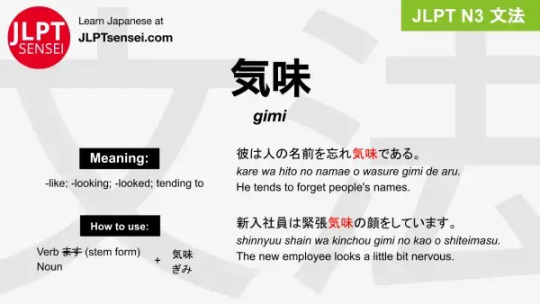
This is used to express that something looks or seems to be a certain way.
疲れ気味 【つかれぎみ】= looks / seems tired.
太り気味 【ふとりぎみ】 = looks / seems large
遅れ気味 【おくれぎみ】= tends to be late
寝不足気味 【ねぶそくぎみ】= looks / seems to be sleep deprived
残業続きで疲れ気味だ。
I've been feeling rather tired because of continuous overtime work.
新入社員は緊張気味の顔をしていた。
The new employee looked nervous.
彼は人の名前を忘れ気味である。
He tends to forget people's names.
彼女は遠慮気味にそう言った。
She said that hesitantly.
#日本語#japanese#japanese language#japanese langblr#japanese studyblr#langblr#studyblr#文法#japanese grammar#jlpt n2#jlpt n3#tokidokitokyo#tdtstudy
109 notes
·
View notes
Text
How to Improve Your Handwriting in Japanese
Learning to write in Japanese, teaching others to learn to write in Japanese, and watching Japanese people write in Japanese has taught me that it’s hard to write in Japanese. Remembering how to write the kanji in the first place is hard (especially with the ease of writing in Japanese on the computer or phone), remembering the stroke order and then figuring out how to fit the character into the space that you have - these are all difficult. And then on top of that, you don’t want these beautiful characters to look like you were bouncing up and down on a dirt road while you wrote them.
Handwriting in any language varies by person. There are people whose handwriting is sloppy in Japanese, just as in any other language. My handwriting in English isn’t perfect either, but I want my kanji to look less like shaky squiggles and more like, well, a native Japanese speaker’s characters. So I decided to break down how I go about improving my Japanese handwriting.

Practice
When you learn to write in English, you practice your letters over and over again. When you first learn kana and then kanji, it is also a good idea to write them over and over again. This helps many people to remember the characters (stroke order, spatial placement of each part of the character), and by writing the characters over and over again you will be able to write more quickly. You also won’t have to look up simple characters over and over again when you want to write a composition or a letter.
When I first started writing compositions by hand in kanji I remember looking up a character in the dictionary to check stroke order or to check how the kanji was written more often than not. This is a difficult way to write anything and takes a lot of time. Practice will help you to remember the characters and not have to stop to check your dictionary as often.
A high school friend told me that her mother would sit her down at the table every night and force her to work on her penmanship until it was what her mother deemed suitable. When we wrote our AP English essays in class, her penmanship was impeccable, although it took her much longer to write the essays than most of the other students. The result of what she considered torturous practice was amazing handwriting that made me jealous. If I had spent every night laboriously perfecting my penmanship I might also have attained that kind of handwriting - but I did not.
This is an extreme example, and I’m not saying you have to have perfect handwriting, but if improving your handwriting is something you would like to accomplish, taking the time to practice will certainly help your penmanship.
Books
There are Japanese books dedicated to this, because beautiful handwriting is desirable in all languages, but they are written in Japanese and I personally didn’t want to buy a book for this purpose.
Websites
Websites are a bit more difficult to come by because most people want to make some money off telling you their penmanship secrets. However, there are a few websites with some examples of good penmanship.
Links
Here are some online links for handwriting practice:
Chibi Musu Drill is where I look for kana practice for my toddler. They have a variety of drill print-outs that you can use to practice writing the characters correctly. This is especially helpful if you are self-studying as it helps with the shape of characters and the stroke order, and how the stroke should be finished (i.e. abrupt stop or drag and fade out to a tail). There are also tests you can print out for kanji. The site is all in Japanese.
Hiragana | Katakana | Kanji
Seiho’s YouTube Calligraphy School - VIDEO - Only in Japanese but the videos are easy to follow since she uses a red pen to highlight where to pay attention. This is more in-depth but has helpful hints on improving your kanji balance, but you can search 字がきれいに書く方法 to get more results.
Yumefude Penji on Instagram has videos showing how to write kanji properly.
How I Practice Handwriting in Japanese
For Kana
To practice handwriting kana, I find an example of good penmanship from a website. It’s best if the example is larger, or if I can blow it up. Then I print it out with darkened font. Drill print-outs also work well as they have characters for you to trace, then space for you to practice on your own.
I put a sheet of clean paper on top of the print-out and make sure I can read the characters through the clean paper. You can also get tracing paper. Then, I trace the characters multiple times. I try to feel the flow of the character as I trace it and to note if the stroke ends abruptly (とめ), has a kink in it (はね), or if it fades out to a tail (はらい).
Lastly, I practice on my own. I use the feel of the character I traced and try to replicate it. I compare my own work to the original sample, and try to determine how to get the characters to look closer to the original sample. My character might be too skinny, too round, or have a stroke out of place. I usually only do one character at a time until I am satisfied, and then move on to the next.
For Kanji
When practicing kanji, first, I use blank paper, download genkouyoushi (Japanese composition paper), or a notebook with wider line spacing for writing practice than I would for simply writing down vocabulary or notes. You can also buy special kanji practice notebooks. I do this so that I have the space to cleanly write out kanji with more strokes, rather than having to bunch together the strokes so that I can hardly read it. This way, I can practice the strokes with more room and pay attention to how the kanji fits together.
Then, I write the character several times. I try to get a muscle memory going for the character, remembering the individual parts, the radicals, the stroke order and what the kanji means. This helps me to remember the kanji, and then to understand how the individual parts fit together.
I am careful to not copy the typewritten Japanese characters, for these are often different than the handwritten characters. Using a kanji textbook or a website where they teach handwritten kanji is the best way to learn to handwrite kanji. Some dictionary apps also show stroke order and will show the handwritten version so you can see the difference.
9 Tips for Better Handwriting
Source
1. Hold your pen properly / ぺんを正しく持つ
2. Sit with proper posture / 正しい姿勢で座る
3. Create a calm setting where you can concentrate / 落ち着いて集中できる空間を作る
4. Write using the correct stroke order / 正しい書き順で書く
a. From the top to the bottom / 上から下へ
b. From the left to the right / 左から右へ
5. Take care with the Stop - Wing - Sweeping Stroke / とめ・はね・はらいを丁寧に

Showing stop - wing - sweeping stroke in kanji
6. Modulate the size of the character and write slowly and carefully / 大きさにメリハリをつけながら、ゆっくり書く
7. Make sure the characters rise to the right / 右上がりになるようにする
8. Make sure the spacing between lines is equal / 線と線の間隔が等しくなるようにする
9. Write with the intention of being read by others / 人に読まれるつもりで書く

My handwriting in Japanese is far from perfect, but when I have a chance I like to hand write characters to get a better feel for them and for their meanings. I hope this guide helps you to improve your penmanship!
#writing in japanese#japanese handwriting#improve your handwriting in japanese#japanese#japanese language#japanese langblr#japanese studyblr#字をきれいに書く方法#tokidokitokyo#tdtstudy
130 notes
·
View notes
Text
そつなく
without (making) any mistakes; flawlessly; accurately
あの人はそつなく仕事をこなせる人で頼りになる。
あの ひと は そつなく しごと を こなせる ひと で たより に なる。
That person is someone who can do the job smoothly and who is reliable.
そつなくこなす to do it smoothly

#日本語#japanese#japanese language#japanese langblr#langblr#studyblr#単語#語彙#japanese vocabulary#tokidokitokyo#tdtstudy
311 notes
·
View notes
Text
ことわざ 17/?
ことわざ are Japanese proverbs, and I have listed some basic proverbs, their equivalents in English, and a rough translation of the meanings of the Japanese phrase.
There is a test for ことわざ called the ことわざ能力検定 (ことわざのうりょくけんてい) and these are some of the phrases that appear in level 9 or 9級 (10 being the lowest level). For the time being, try one or two of these out the next time you speak with a native Japanese speaker!
ことわざ (こと検9級): 11 | 12 | 13 | 14 | 15 | 16
More ことわざ (こと検10級): 1 | 2 | 3 | 4 | 5 | 6 | 7 | 8 | 9 | 10

眉を顰める
まゆをひそめる
to furrow your brow
furrow your brow
緑の黒髪
みどりのくろかみ
lustrous black hair
black hair with a greenish sheen
身に染みる
みにしみる
to be deeply moved; to have wind/cold pierce the body
a feeling that permeates the body
身につまされる
みにつまされる
to be touched by another's plight
feel a pinch of guilt on your body
身の毛がよだつ
みのけがよだつ
hair-raising; spine-tingling
have your body's hair stand up in fear or from cold
耳が痛い
みみがいたい
hitting close to home
accurate criticism that is painful to the ear
耳が早い
みみがはやい
in the know
ears are quick to receive new information
耳に入れる
みみにいれる
to inform
put into someone's ear
耳に胼胝ができる
みみにたこができる
to hear ad nauseum
told something so much it creates calluses in your ears
耳に付く
みみにつく
irritating or annoying (sound)
a sound that sticks in the ear
耳寄りな話
みみよりなはなし
a topic of interest
talk that makes ears approach
耳を疑う
みみをうたがう
to doubt your own ears
doubt your ears
耳を貸す
みみをかす
to lend an ear
lend an ear
耳を傾ける
みみをかたむける
to listen closely
tilt your ear over to listen
耳を澄ます
みみをすます
to focus your attention (and listen)
clear out your ears
耳を揃える
みみをそろえる
to get the money together (to pay a debt)
arrange the ears (edges) of your coins
身を入れる
みをいれる
to give it your all
put in your whole body
身を切られる思い
みをきられるおもい
heartrending
a thought that cuts your body
身を削る
みをけずる
to work yourself sick
whittle away your body with work
身を粉にする
みをこにする
to work hard without complaint
work your body into powder
身を立てる
みをたてる
to make something of yourself; to make it on your own
raise up your body
胸が痛む
むねがいたむ
to feel great sympathy
chest in pain
胸が一杯になる
むねがいっぱいになる
to be overcome with emotion
chest like a cupful of joy or sadness
胸が躍る
むねがおどる
excited; psyched up
chest dancing with joy or in anticipation
胸が騒ぐ
むねがさわぐ
to feel uneasy
chest disturbing you with feeling something bad is going to happen
胸がすく
むねがすく
to be relaxed, worry-free
chest clear of worry
胸が詰まる
むねがつまる
to feel uneasy
chest stuffed with sadness or worry
胸に刻む
むねにきざむ
to take something to heart
engrave on your chest
胸を痛める
むねをいためる
to cause someone emotional distress
cause pain in another's chest
胸を打つ
むねをうつ
to touch someone's heart
strike someone's chest
胸を借りる
むねをかりる
to train with a superior
in sumo, to borrow someone's chest is to have the honor of training with them
胸を撫で下ろす
むねをなでおろす
to let out a sigh of relief
rub down your chest and let go of worries
胸を膨らませる
むねをふくらませる
to be wide-eyed and full of hope
inflate your chest with hope or joy
目から鱗が落ちる
めからうろこがおちる
to have the scales fall from your eyes
to have the scales fall from your eyes
目から鼻へ抜ける
めからはなへぬける
sharp as a tack
from a story where a craftsman enters the eye of a Buddha statue to affix the eye from inside. since he’s trapped he has the brilliant idea to escape through the nose of the statue.
目から火が出る
めからひがでる
to see stars
sparks coming out of your eyes
目が利く
めがきく
to be discerning
effective eyes
目が肥える
めがこえる
to be discerning
eyes grown fat with experience and knowledge
目頭が熱くなる
めがしらがあつくなる
to tear up with emotion
eyes and head warm with emotion
目が高い
めがたかい
to be highly discerning
so learned, it's as if your eyes are surveying from high above
目が無い
めがない
① to have no eye for something; ② to lose objectivity
① have no eye for something; ② no eye for, or blind to, reality
目が回る
めがまわる
to be extremely busy
so busy your eyes are spinning
目くじらを立てる
めくじらをたてる
to needlessly nitpick
raise up the speck in the corner of someone's eye for all to see
目糞鼻糞を笑う
めくそはなくそをわらう
the pot calling the kettle black
eye crud laughing at snot
目と鼻の先
めとはなのさき
extremely close together
as close as the space before your eye and nose
目に余る
めにあまる
to be unforgivable, unable to be overlooked
too much for your eyes to handle
目に物見せる
めにものみせる
to teach someone a lesson; to show someone what's what
show something before someone's eyes
目の色を変える
めのいろをかえる
to put on your game face
change the color of your eyes to indicate seriousness or anger
目の上の瘤
めのうえのこぶ
a thorn in your side; a pain in the butt
a person whose existence is like a lump above your eye
目の黒いうち
めのくろいうち
while you still live; while you still draw breath
while your eyes are still black (grey/white pupils indicate death)
目の毒
めのどく
something you really don't need to see right now
poison for the eyes because it will trigger craving/desire or cause discomfort
目も当てられない
めもあてられない
a sight that is too much to bear
so horrible, eyes can't hold witness to it
目もくれない
めもくれない
to completely ignore
not give an eye (attention) to something
目を疑う
めをうたがう
to not be able to believe your own eyes
doubt your eyes
目を奪われる
めをうばわれる
to be captivated
have your sight stolen and held captive by something
目を覆う
めをおおう
to cover your eyes
cover your eyes in fear
目を掛ける
めをかける
to show favoritism
place eyes upon, watch over someone
目を配る
めをくばる
to keep an eye on
distribute your gaze around the area
目を皿のようにする
めをさらのようにする
to widen one’s eyes in shock
make your eyes like plates
目を白黒させる
めをしろくろさせる
to be shocked and flustered
eyes darting so fast they look white and black
目を付ける
めをつける
to fix your gaze upon something
attach your eyes
目を盗む
めをぬすむ
to do something in secret
steal someone's eyes, act outside their vision
目を光らせる
めをひからせる
to keep careful watch
shine your gaze upon someone/something
目を引く
めをひく
to draw attention; to create a distraction
pull someone's gaze
目を細める
めをほそめる
to smile warmly
smile so that your eyes narrow
目を丸くする
めをまるくする
to open your eyes wide in shock
make your eyes round
目を見張る
めをみはる
to be impressed or moved emotionally
eyes open wide in pleasant surprise
目を剥く
めをむく
to have eyes wide in shock or anger
eyes peeled wide open
#日本語#japanese#japanese language#japanese langblr#langblr#studyblr#ことわざ#japanese proverbs#こと検9級#ま#ま~も#tokidokitokyo#tdtstudy
81 notes
·
View notes
Text
ことわざ 16/?
ことわざ are Japanese proverbs, and I have listed some basic proverbs, their equivalents in English, and a rough translation of the meanings of the Japanese phrase.
There is a test for ことわざ called the ことわざ能力検定 (ことわざのうりょくけんてい) and these are the phrases that appear in level 9 or 9級 (10 being the lowest level). For the time being, try one or two of these out the next time you speak with a native Japanese speaker!
ことわざ (こと検9級): 11 | 12 | 13 | 14 | 15
More ことわざ (こと検10級): 1 | 2 | 3 | 4 | 5 | 6 | 7 | 8 | 9 | 10

歯が浮く
はがうく
cringe-inducing
causing an uncomfortable feeling akin to a loose tooth
歯が立たない
はがたたない
to stand no chance against (opponent/challenge)
teeth cannot stand against the hardness
鼻息が荒い
はないきがあらい
expressing passion and excitement
breathing heavily through the nose
鼻が利く
はながきく
to have a knack for finding money-making opportunities
nose is effective in sniffing out money-making opportunities
鼻が高い
はながたかい
to be filled with pride
hold your nose high
鼻であしらう
はなであしらう
to treat someone with contempt
signal contempt using your nose
鼻で笑う
はなでわらう
to scoff
laugh through your nose
鼻に掛ける
はなにかける
to brag, boast or show off
hang prominently on your nose
鼻に付く
はなにつく
to become tiresome
tiresome behavior that becomes like a bad stench that sticks in your nose
鼻持ちならない
はなもちならない
to become unbearable
bad attitude/behavior likened to a stench so bad you can't stand it even when holding your nose
鼻を明かす
はなをあかす
to outwit, get the jump on, catch off guard
reveal your nose and surprise your opponent
鼻を折る
はなをおる
to take someone down a peg
break someone's nose
鼻を突く
はなをつく
putrid, rank, foul
a smell that stabs the nose
鼻を鳴らす
はなをならす
to whine in an attempt to get your way
to sound your nose
歯に衣着せぬ
はにきぬきせぬ
blunt, straightforward, without 'sugar-coating' it
without applying coating to your teeth
歯の抜けたよう
はのぬけたよう
appearing empty or deserted
like a mouth with its teeth removed
歯の根が合わない
はのねがあわない
teeth chattering from cold/fear
unable to align the base of your teeth
腹が黒い
はらがくろい
deceptive, conniving, black-hearted (also, 腹黒い)
black stomach (disposition)
腹が据わる
はらがすわる
to feel confident
have your stomach (courage) steadied
腹が立つ
はらがたつ
to get angry
have your stomach (disposition) get riled up
腹が減っては戦はできぬ
はらがへってはいくさはできぬ
you can't work on an empty stomach
you can't do battle when hungry
腹に据え兼ねる
はらにすえかねる
to have all you can stand; to be fed up
unable to settle your stomach (disposition)
腹の皮が捩れる
はらのかわがよじれる
side-splitting
makes you laugh so hard the skin of your stomach twists
腹の虫が治まらない
はらのむしがおさまらない
to have all you can stand; to be fed up
unable to settle your stomach worm (from ancient belief that Three Demonic Worms live in the head, chest and stomach and monitor the host's behavior)
腸が煮え繰り返る
はらわたがにえくりかえる
to have your blood boil
have your organs boiling repeatedly
腹を探る
はらをさぐる
to try and infer what someone is thinking/feeling
search someone's stomach (disposition)
腹を割る
はらをわる
to open up (and converse frankly)
split your stomach (emotional center) open
歯を食いしばる
はをくいしばる
to grin and bear it
bite and lock your teeth
膝を交える
ひざをまじえる
to get together for a friendly chat
sit knees crossed and chat
人の口には戸は立てられぬ
ひとのくちにとはたてられぬ
people are gonna talk
you can't erect a door over a person's mouth
一肌脱ぐ
ひとはだぬぐ
to help in any way you can
remove your top and expose your upper body skin to signal intent to get serious and help
腑に落ちない
ふにおちない
unsatisfying (conclusion or explanation)
does not fall in line with your gut (better judgment)
臍で茶を沸かす
へそでちゃをわかす
you're killing me!; that's rich!
that makes me laugh so hard, I could boil tea on my bellybutton! usually said in a mocking manner)
臍を曲げる
へそをまげる
to get cranky
hunched over grumpy making your bellybutton bend
下手な鉄砲も数撃てば当たる
へたなてっぽうもかずうてばあたる
given enough tries, anyone can succeed
even a poorly handled cannon, fired enough times will hit the mark by sheer chance
下手の考え休むに似たり
へたのかんがえやすむににたり
an idiot in thought may as well be napping
a poor attempt at thinking is the same as just resting
下手の横好き
へたのよこずき
a glutton for punishment
unskilled at something, but you insist on liking it
臍を噬む
ほぞをかむ
to regret bitterly
using the futility of trying to chew your own bellybutton as a metaphor for the futility of agonizing over the past
骨折り損の草臥れ儲け
ほねおりぞんのくたびれもうけ
a whole lot of effort for a whole lot of nothing
work til you suffer broken bones and earn only exhaustion
骨が折れる
ほねがおれる
difficult or intensive (work)
work that will break your bones
骨身を削る
ほねみをけずる
to work yourself to the bone
shave down your body and bones with work
骨を埋める
ほねをうずめる
to live out your life somewhere; to dedicate your life to a pursuit
bury your bones somewhere
骨を折る
ほねをおる
to work hard without complaint
break your bones to accomplish something or support someone
#日本語#japanese#japanese language#japanese langblr#langblr#studyblr#ことわざ#japanese proverbs#こと検9級#は#は~ほ#tokidokitokyo#tdtstudy
114 notes
·
View notes
Text
New Year's Resolutions in Japanese
It's almost that time of year, to make resolutions that you may or may not keep! Here's how to make some of those resolutions in Japanese!
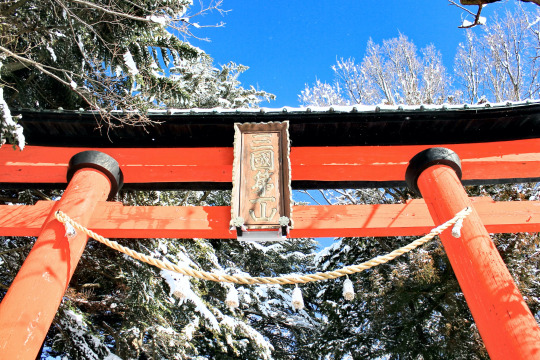
Vocabulary to Use for New Year's Resolutions
新年の抱負 しんねんのほうふ New Year's resolution
抱負 ほうふ aspiration; ambition; plan; hopes; wishes
新年の誓 しんねんのちかい New Year's resolution (less common)
誓 ちかい oath; vow
目標 もくひょう goal
習慣 しゅうかん habit
癖 くせ (negative) habit
Grammar Forms to Use for New Year's Resolutions
~(verb)たい want to do ~
毎日散歩したい
まいにちさんぽしたい
I want to walk every day
~(verb)こと verb nominalizer (allows verbs to act as nouns)
毎日ジムに行くこと
まいにちジムにいくこと
Go to the gym every day
~ことにする decide on/intend to do ~
毎晩10時の前に寝ることにする
まいばん10じのまえにねることにする
I intend to go to bed before 10 every night
10 Common New Year's Resolutions in Japan
健康に気を付けること
けんこうにきをつけること
Take care of one's health
本をたくさん読むこと
ほんをたくさんよむこと
Read a lot of books
家族と多くの時間を過ごすこと
かぞくとおおくのじかんをすごすこと
Spend more time with family
やせる
Lose weight
お金を貯める
おかねをためる
Save money
禁煙する
きんえんする
Quit smoking
習い事を始める
ならいごとをはじめる
Learn something new
お酒の量を減らす
おさけのりょうをへらす
Drink less alcohol
運動の習慣をつける
うんどうのしゅうかんをつける
Exercise regularly
試験に合格することにする
しけんにごうかくすることにする
Pass an exam
How to Stick to Your New Year's Resolutions
自分、あるいは他の人に責任を持たされる
じぶん、あるいはほかのひとにせきにんをもたされる
to be held accountable by yourself or by others
抱負の数を限る
ほうふのかずをかぎる
limit the number of resolutions
抱負を細かく決める
ほうふをこまかくきめる
decide resolutions in detail
What are your New Year's resolutions?
#日本語#japanese#japanese language#japanese langblr#japanese studyblr#langblr#studyblr#japanese vocabulary#単語#語彙#japanese new year's resolutions#new year's resolutions in japanese#tokidokitokyo#tdtstudy
146 notes
·
View notes
Text
没頭
ぼっとう
immersing oneself in; being absorbed in; devoting oneself to; giving oneself up entirely to
彼女は研究に没頭している。
かのじょ は けんきゅう に ぼっとう している。
She is deep in research.

#日本語#japanese#japanese language#japanese langblr#langblr#studyblr#単語#語彙#japanese vocabulary#tokidokitokyo#tdtstudy
213 notes
·
View notes
Text
限る
かぎる
① to restrict; to limit; to confine
② to be restricted to; to be limited to; to be confined to
③ to be best (for); to be the best plan; to be the only way (to)
(…は…に限る)
地球の資源は限られている。
ちきゅう の しげん は かぎられている。
The earth's resources are limited.

#日本語#japanese#japanese language#japanese langblr#langblr#studyblr#単語#語彙#japanese vocabulary#tokidokitokyo#tdtstudy
77 notes
·
View notes
Text
美味
びみ
good flavor; good flavour; delicacy; dainty
むしパンは美味です。
むしパン は びみ です。
Steamed buns are delicious.

#日本語#japanese#japanese language#japanese langblr#langblr#studyblr#単語#語彙#japanese vocabulary#tokidokitokyo#tdtstudy
108 notes
·
View notes
Text
目まぐるしい
めまぐるしい
dizzying (speed, changes, etc.); rapid; drastic; bewildering; hectic; bustling (e.g. world), (note: usually written using kana alone)
朝から目まぐるしく働く。
あさ から めまぐるしく はたらく。
Working at a hectic pace from the morning.

#日本語#japanese#japanese language#japanese langblr#langblr#studyblr#単語#語彙#japanese vocabulary#tokidokitokyo#tdtstudy
73 notes
·
View notes